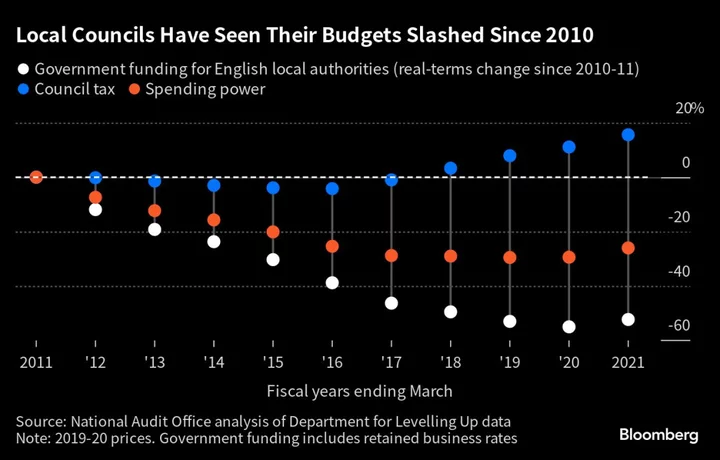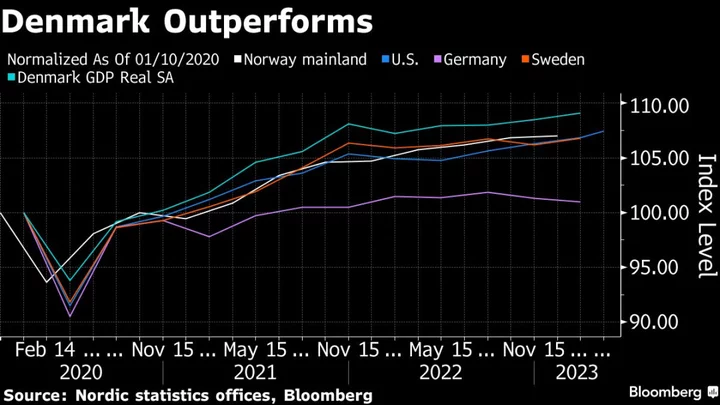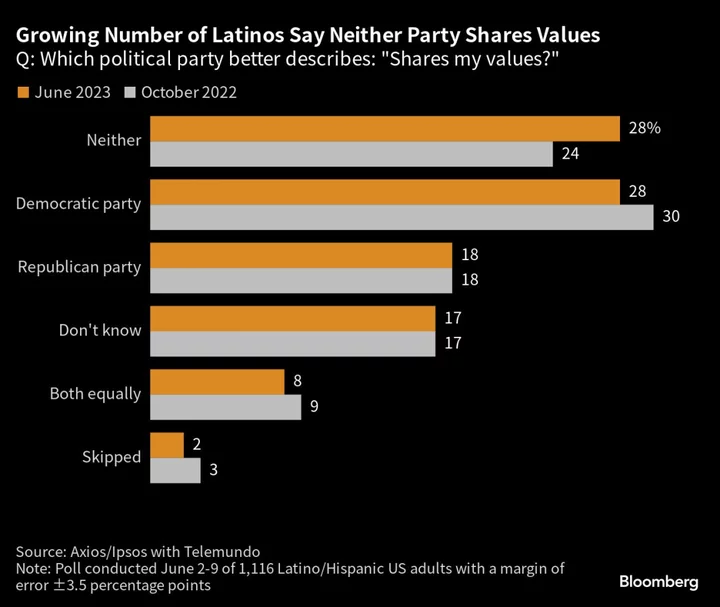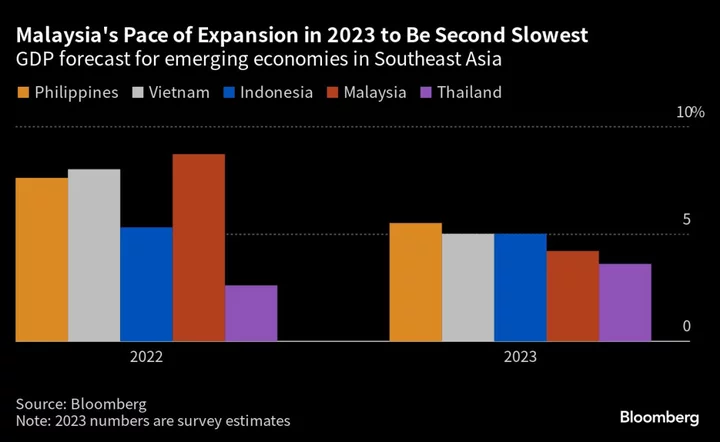Equal-pay claims that tipped Britain’s second-biggest city into bankruptcy are likely to spread to more local government authorities, deepening a funding crisis that’s cutting into the public services.
The GMB, the trade union that spearheaded legal action in Birmingham that resulted in additional claims worth up to £760 million ($941 million), said it’s working on dozens more investigations and will launch further claims in the next 12 months. The cases relate to jobs where women were denied bonuses offered to men working at a similar level.
“Everywhere we have looked, we have found some element of pay discrimination — and we haven’t managed to look everywhere yet,” Rhea Wolfson, the GMB’s head of industrial relations, said in an interview. She said this was a “cross-party issue” and that it would take more legal action.
Prime Minister Rishi Sunak’s Conservative government intervened after the collapse in Birmingham, which effectively declared bankruptcy because of the scale of the settlement. Government-appointed commissioners are now reviewing ways to plug the hole in its finances, including drastically paring back services, asset sales and raising money from taxpayers.
Replicating the GMB’s campaign across dozens of local authorities would amplify concerns about the underfunding for public services in the run-up to a general election expected next year. The UK government — whether under the Conservatives or the Labour opposition — will struggle to plug the gap given the Treasury’s already severe constraints, which will be highlighted on Wednesday in Chancellor of the Exchequer Jeremy Hunt’s autumn fiscal statement.
The situation puts Labour leader Keir Starmer in a difficult position. The GMB is one of Labour’s 11 affiliated unions and was the party’s second-largest donor in the first half of this year. Its action includes targeting councils run by the party’s members and it could worsen a crisis in local government that Starmer would inherit if he wins power in an election expected next year.
In the mean time, the two parties are pointing the finger at each other: The government in Westminster says the opposition party has mismanaged local finances, while Labour blames the Conservative-led austerity plans from a decade ago with hollowing out council budgets.
At the heart of the dispute is a 2012 ruling from the UK Supreme Court, which backed a group of mostly female staff for the Birmingham council who were not given bonuses handed to employees in traditionally male-dominated roles. While the city said in June that it had already paid out £1.1 billion due to the ruling, it uncovered an additional bill that has crippled finances.
The GMB said that more than 3,000 workers have joined the legal action against Birmingham that it says have had hundreds of millions of pounds “stolen” from them. Workers reportedly involved in the disputes have struggled with bills and used credit cards to pay everyday costs before the equal-pay problem was uncovered.
Stefan Cross, a key lawyer in the equal-pay battle who has represented council workers in Birmingham and Glasgow, warned that there were still “several billion pounds worth of additional liabilities currently in the pipeline” from similar equal pay disputes and that more authorities are at risk of being dragged into a costly legal fight.
The Local Government Association, which represents councils in England and Wales, also fears the problem is widespread and will be one of the biggest threats for councils that have a reduced buffer after years of stretched budgets and running down reserves. It warned last month that councils are already facing a £4 billion funding gap over the next two years.
“I suspect it’s going to affect most councils,” Pete Marland, chair of the LGA’s resources board, said in an interview. “It’s about overall the local authorities’ ability to be able to absorb a shock to the system is less than it ever has been.”
The indication is that Birmingham’s equal-pay problems are endemic across the UK, leading to a fresh wave of claims at a time when finances at many councils are already at breaking point.
A number of councils have issued so-called Section 114 notices, an effective bankruptcy, as they are squeezed by cuts to funding from central government, inflation, rising demand for services such as social care and risky property investments that have soured.
“We have a number that we are investigating across the country and there will be ones that we haven’t started to investigate yet,” said the GMB’s Wolfson. She said a “lot more will come in the next 12 months” and that after the initial 20 councils are probed “there’ll be another 20 and there’ll be another 20.” Councils in three London boroughs, England’s south coast and Scotland are among those being probed, she added.
The government has sought to distance itself from the problems in Birmingham and other councils, even as local leaders warn that their financial difficulties are symptomatic of a crunch point for the funding model for local authorities.
Cross and Birmingham City Council leader John Cotton warned the equal-pay problem is likely to be widespread as campaigners plan to step up action against offending councils. Local authorities in Glasgow, Sheffield and Sunderland are among those to have also been embroiled in equal-pay disputes.
Cross warned that councils were underestimating the threat of legal action and huge payouts they could potentially owe.
“The councils never properly budget for this eventuality, even when they have ongoing litigation,” he said in an interview. “They always assume they’re going to win and never budget for the outcome.”
“They always think that they are different from all the other councils that are facing the same problem,” he said.
Cotton said that it was “very clear that there are equal pay challenges elsewhere as well.”
“We have to get to a point where we ensure that our staff are paid equally and fairly. This is about cleaners, care assistants, refuse collectors all being paid properly and fairly for what they do so we’re determined to get that right.”









